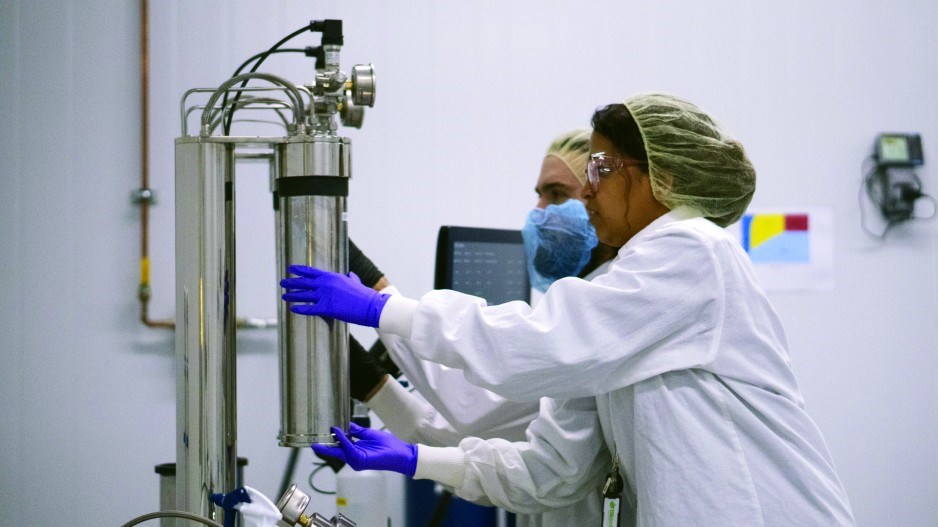Valens GroWorks Corp. (TSX-V:VGW) is excited about Canada’s recent legalization of cannabis edibles, drinks and concentrates – perhaps even more than he was in October 2018, when Canada legalized dried cannabis sales.
That’s because Valens specializes in cannabis extraction – a process that separates cannabinoids from the cannabis plant to turn the material into concentrates.
“We really view this as our legalization this year,” said Everett Knight, executive vice-president of strategy and investments for the Kelowna-based company. “Last year, I think, was everyone else’s, and this is our legalization with the products coming to market.”
Cannabis extracts can be used to develop concentrates used in vape pens, edibles, beverages, capsules and topicals.
Knight describes the market potential for these as “gigantic.”
In June, his company announced that it planned to expand annual production capacity to 425,000 kilograms from 240,000 kilograms of dried cannabis and hemp biomass.
It aims to increase that to one million kilograms annually by 2020.
“The new consumer coming on board, they’re leaning more toward an oil-derivative product,” Knight said, referring to observations in California and Colorado where these products are legally available at the state level.
Extraction works by applying pressure and heat to extract a cannabinoid slurry from cannabis plants. That compound, or further refined compounds, could then be used to create ingestible products.
Popular extraction methods include using liquefied carbon dioxide (C02), ethanol, butane or propane. Health Canada has strict standards for how much residual solvent may be present in finished products.
Solventless extraction is also possible.
Different extraction methods are optimal for creating different products.
C02 extraction, for example, is ideal for producing oil for capsules and vape pens, Knight said, while ethanol extraction may be best used to deliver topicals.
“The reason we do all of those [extraction methods] is just so we can work backwards, because [through] each one you can make different products,” he said.
“So we just work backwards with our customers to say, ‘What do you want?’ and we can use any different type of extraction.”
Extraction technology can be complex and expensive while requiring specialized experts.
Langley-based Blissco Cannabis Corp., for example, paid about $250,000 for a machine that delivers concentrates through the C02 process.
“We’re very bullish on Cannabis 2.0,” said CEO Damian Kettlewell, using the slang term for the next round of cannabis legalization.
His company plans to sell items such as cannabis-oil tinctures and other extraction products.
“From a business perspective as well, these products are higher margin, much more lucrative than the dried-flower market,” he said. “So we’re able to create different products and really establish a brand that resonates with customers.”
Toronto-based Supreme Cannabis Co. Inc. (TSX:FIRE) finalized its acquisition of Blissco in July, giving it access to the B.C. company’s extraction expertise so that it can apply that capacity to its own dried cannabis products.
Supreme was an investor in Blissco prior to the acquisition, putting $3 million into the company in a funding round announced in early 2018.
Kettlewell said the acquisition makes for a good marriage between the companies’ respective specialties as Cannabis 2.0 approaches.
“We’re still in the first inning of the legalization journey,” he said.
“Those companies that can develop a strong brand and expertise now … are going to be able to produce significant revenue domestically and internationally.”
Blissco has been in talks with different provincial governments as well as German representatives about supplying cannabis oils, and the company is in the midst of building an ethanol extraction lab to complement its C02 extraction lab.
Kettlewell said the additional lab has the capacity to expand annual production to seven million 30-millilitre cannabis oil tincture bottles annually.
“That is really going to catapult Blissco,” he said, noting these bottles can retail for between $75 and $120 per unit.
Other cannabis producers, meanwhile, are looking to capitalize by partnering with cannabis extraction ventures.
Valens has announced five partnerships with licensed producers so far this year.
Instead of the licensed producers having to develop their own expertise, and acquiring the infrastructure for in-house extraction, Valens plans to complete the extraction process for these companies.
Companies jumping on board this year include Nanaimo’s Tilray Inc. (Nasdaq:TLRY) and Maple Ridge-based Tantalus Labs.
“Tantalus Labs has built a strong core competency in cannabis genetics and cannabis agriculture. To learn extraction to the sophistication of Valens would be like getting a second PhD for us,” CEO Dan Sutton said in an email.
“Hence, we rely on partnerships for translating our exclusive and exciting genetics into new form factors through collaboration with Valens, letting each party flex their best skills to the benefit of our end customer.”
Sutton said that based on his company’s research from the U.S., he believes the market potential of products derived from cannabis but consumed in more convenient or concentrated forms represents at least half of the mature Canadian cannabis marketplace.
“Vaporization and edibles alone might account for 40% of cannabis consumption preferences, so we need to be there with excellent offerings and partners,” he said.




